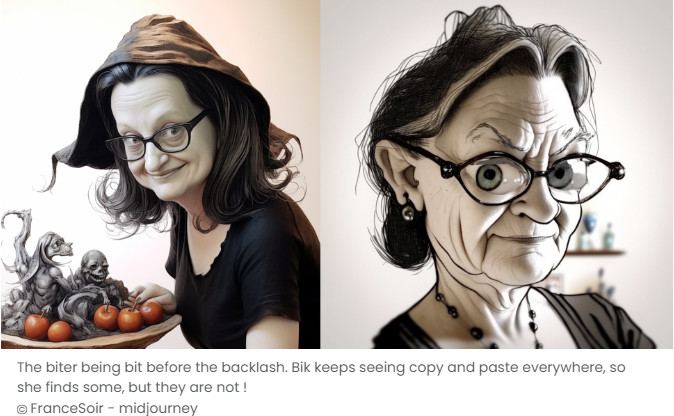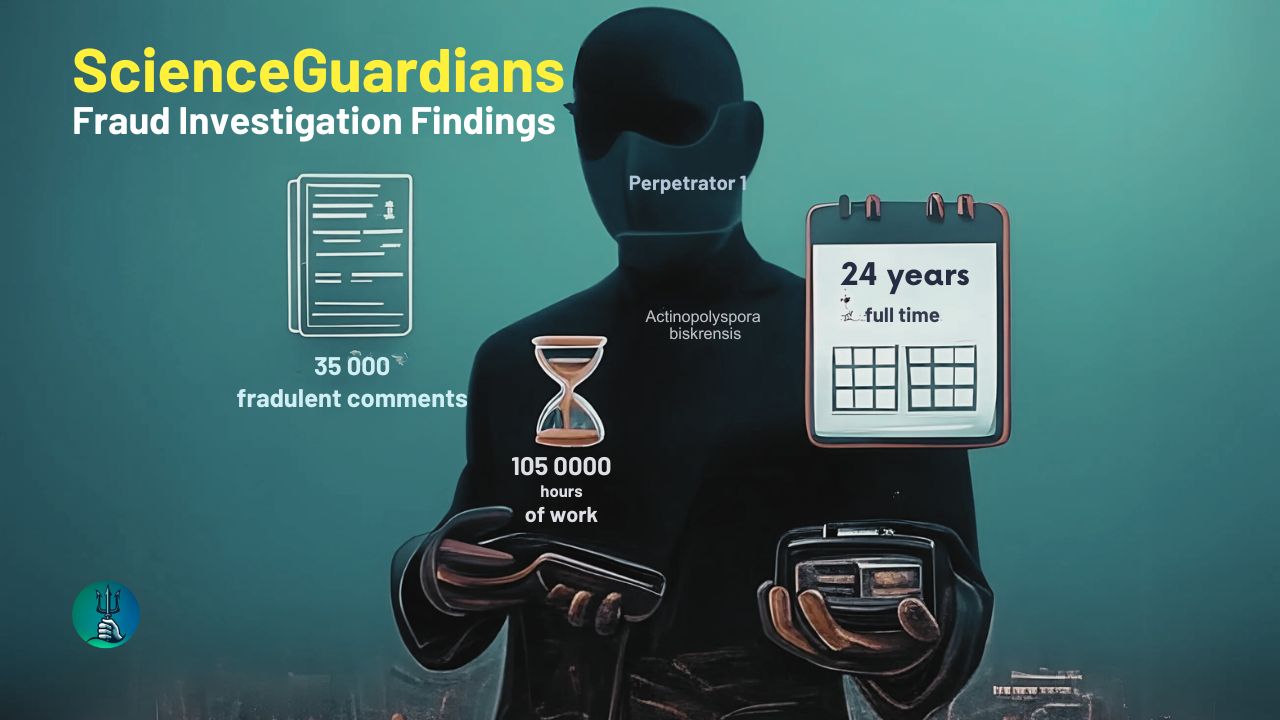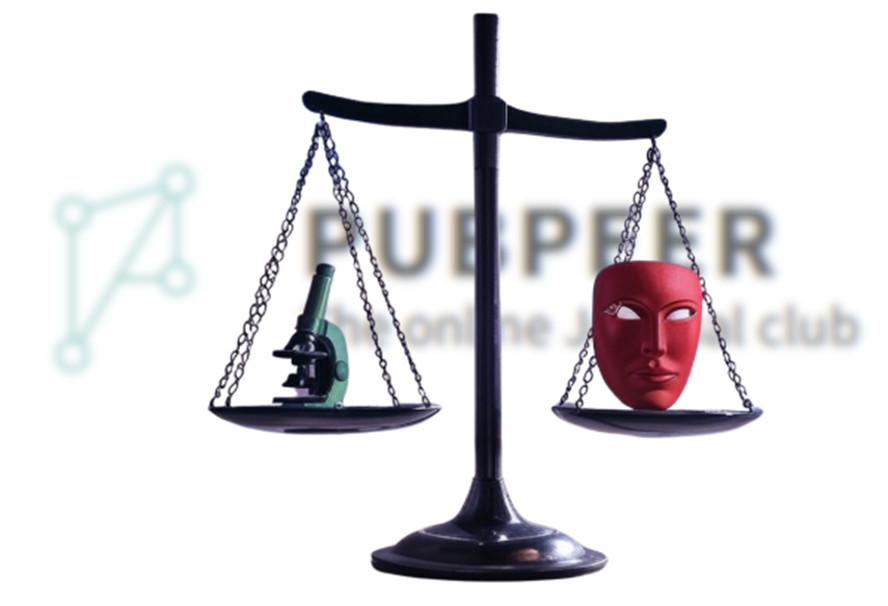France-Soir
Fraud and Harassment on PubPeer: ScienceGuardians Exposes a Scandal Shaking Scientific Research
A Bombshell in the Scientific World
Imagine a platform designed to safeguard scientific integrity, transformed into a tool for harassment and massive fraud. This is the scandal uncovered by ScienceGuardians in a series of explosive posts on X between April 11 and 14, 2025. Their target? An individual dubbed "Perpetrator 1", accused of manipulating identities and posting 35,000 fraudulent comments on PubPeer through anonymous accounts like Actinopolyspora biskrensis and Hoya camphorifolia.
This investigation exposes serious misconduct, from the unjust retraction of critical studies to the silencing of dissenting researchers, with devastating consequences for patients.
Dive into a case that could redefine transparency standards in science.
The Investigation Unfolds: A Methodical Fraud Revealed
An Alarming Alert : On April 11, 2025, ScienceGuardians sounds the alarm on X. They denounce "Perpetrator 1", a financial advisor with no scientific background, accused of manipulating identities within a "mob network" on PubPeer to harm the scientific ecosystem. This initial post sets the stage for a shocking investigation.
ScienceGuardians' Mission (1) and Anonymity: ScienceGuardians defines itself as a global hub dedicated to upholding the highest standards of integrity in scientific research and discourse. Their mission is to combat misconduct, foster accountability, and ensure inclusivity by providing a platform where all voices in the scientific community are respected, while offering resources to address ethical issues constructively. They choose to remain anonymous to ensure that they remain free from conflicts of interest, toprotect their members from retaliation and to focus attention on the evidence rather than the identities of those exposing misconduct, a strategic decision that mirrors the very anonymity they critique when misused, as in the case of "Perpetrator 1".
As a media France-Soir is well aware of the situation with " The Resistant Doctor", an anonymous medical doctor and a Citizen's Collective who assisted in several investigations. France-Soir had to defend the anonymity in court. The Resistant Doctor also explained what this an anonymity permitted (2) :
"To freely express controversial views on lockdowns, early treatments, and experimental vaccines without harassment. This allowed open dialogue, though outspoken critics faced accusations of spreading misinformation."
Mounting Evidence : On April 12, 2025, four posts detail "Perpetrator 1"'s actions:
- Identifying Fraudulent Accounts: ScienceGuardians links "Perpetrator 1" to two PubPeer accounts, Actinopolyspora biskrensis and Hoya camphorifolia, responsible for 35,000 comments over 12 years.
- A Winning Strategy: With guidance from a legal advisor specializing in criminal behavior, ScienceGuardians crafts a targeted post to elicit a confession from "Perpetrator 1", a strategy that proves successful.
- Damning Admissions: "Perpetrator 1" admits to knowing Hoya camphorifolia, using multiple identities, and collaborating with this account to manipulate scientific discussions.
- An Impossible Fraud: ScienceGuardians calculates that the 35,000 comments would require 105,000 hours of work—equivalent to 24 years of full-time effort—making such productivity over PubPeer's 12-year existence "not only improbable but a deliberate fraud."
A Call for Justice: On April 14, 2025, ScienceGuardians concludes with an urgent appeal. They demand a criminal investigation by the FBI, SEC, and U.S. Department of Justice, denouncing a "direct attack on scientific integrity" and pledging to assist law enforcement in restoring trust in the scientific community.
The Victims: among others, Sabine Hazan and the Loss of Opportunity for Patients
"Perpetrator 1" targeted numerous researchers, but the case of Sabine Hazan stands out. In 2022, Hazan published a hypothesis paper in Frontiers in Microbiology. In 2023, the hypothesis paper was retracted following criticisms on PubPeer, including from accounts linked to "Perpetrator 1," questioning its methodology and data analysis. Main author Sabine Hazan contested the retraction, arguing it was driven by a coordinated harassment campaign. Some scientists, such as Kevin McKernan, have expressed strong disagreement with the decision, stating: "Since when are hypothesis retractable? We are allowed to posit questions anymore? 1984".
This retraction, as highlighted in ScienceGuardians' Independent Analysis, "represents an undue suppression of scientific exploration and a dangerous precedent for the future of academic publishing. Such actions discourage scientists from presenting innovative hypotheses and threaten the very foundation of scientific inquiry."
Pr. Christian Perronne a leading infectiologist and scientist in France explains :
"this retraction and the numerous attacks on early treatments have potentially deprived patients of effective COVID-19 treatments, highlighting a significant loss of opportunity caused by this fraudulent activism.With the non-profit BonSens.org, we have been very concerned on the publication of a study on hydroxychloroquine that fraudulently claimed that 17000 patients around the world would have died from taking hydroxychloroquine. The letter of concern we wrote to Elsevier's editor was never published. It was published in different journal and then the study was retracted."
PubPeer: Unwitting Accomplice or Liable Party?
PubPeer, intended to foster scientific critique, has been hijacked in this affair. Its anonymity policy enabled "Perpetrator 1" to multiply identities and launch harassment campaigns against researchers like Hazan. By failing to adequately regulate such abuses, PubPeer could face civil liability for facilitating these harms, including the wrongful retraction of studies and reputational damage to researchers.
Criminally, if complicity in fraudulent activities is proven, the platform could face prosecution, potentially under a RICO claim.
This case raises a profound ethical issue: the misuse of anonymity has led to a tangible loss of opportunity for patients, an issue that may prompt regulators to impose sanctions or demand a complete overhaul of PubPeer's policies.
The Silencing of Scientists and the Imposed Consensus
This affair exposes a broader issue: the silencing of scientists who challenge the consensus. Michael Eisen argues that the scientific community attempted to censor dissenting voices during the pandemic, such as Jay Bhattacharya's (now director at the NIH), and that denying these attempts risks repeating the same mistake.
Martin Kulldorff, co-author of the Great Barrington Declaration, goes further, decrying systematic censorship of scientists questioning the consensus, often orchestrated through platforms like PubPeer.
Such silencing, amplified by harassment campaigns like those of "Perpetrator 1", stifles scientific debate and hinders the advancement of knowledge.
Elisabeth Bik: Fraud Hunter Under Fire
Elisabeth Bik, a microbiologist known for spotting scientific fraud on PubPeer, is embroiled in controversy. While celebrated for exposing misconduct, Bik faces accusations of overzealousness. France-Soir reports she manipulated data to " see fraud where there is none" and would suspected of plagiarism in her own work. Critics argue her aggressive methods often target minor errors rather than outright fraud, fueling distrust in the scientific community.

Her proximity with Barbour a director at PubPeer is also questioned.
Science and Social Media: Amplified Misuse
Science on social media is vulnerable to misuse, as this affair demonstrates. In January 2025, Meta CEO Mark Zuckerberg terminated the company's fact-checking program, criticizing fact-checkers for bias that " destroyed more trust than they created". He opted for a "Community Notes" system, inspired by X, where users flag problematic content.
This move reflects growing distrust in institutional verification systems, a challenge PubPeer also faces. PubPeer's founders, including Brandon Stell, and treasurer Boris Barbour, have been heavily criticized for opaque management, with Barbour accused of bias due to his CNRS ties.
Is PubPeer's survival at stake? Its civil and criminal liability could be engaged if lawsuits, such as a RICO action, succeed.
A RICOLawsuit: A Path to Justice for Victims?
ScienceGuardians suggests a potential lawsuit under the Racketeer Influenced and Corrupt Organizations Act (RICO). This U.S. law requires:
- a criminal enterprise (the network of fraudulent accounts on PubPeer);
- illegal acts over 10 years (the 35,000 fraudulent comments);
- direct harm to victims (such as Hazan's study retraction); and
- coordination (proven by "Perpetrator 1"'s admissions).
A successful RICO claim could result in triple damages for victims, providing a path to justice for the harms inflicted.
The following is the potential legal actions suggested by ScienceGuardians:
Perpetrator 1, the financial advisor, is prosecutable under U.S. law for repeatedly attacking high-profile scientists with derogatory terms (we have documented numerous pieces of undeniable evidence), particularly given their thousands of PubPeer comments under false identities and alleged confession to fraudulent actions.Civil defamation is highly likely if scientists sue, as the attacks likely cause harm to reputations and lack credible basis due to the advisor's non-scientific background. Criminal prosecution for wire fraud (18 U.S.C. § 1343), false statements (18 U.S.C. § 1001), or cyberstalking (18 U.S.C. § 2261A) is moderately likely, supported by the targeted attacks and deceptive pseudonyms, but requires specific evidence of false claims, tangible harm (e.g., professional losses), or intent to harass.
Prosecution hinges on PubPeer comment logs, victim testimonies, and financial records to prove harm or benefit. The attacks suggest intent to harm and further investigation could strengthen a case, especially for defamation or fraud.
A Turning Point for Scientific Integrity?
ScienceGuardians' investigation exposes systemic fraud on PubPeer, highlighting the dangers of unverified anonymity and the silencing of dissenting researchers. Beyond harming scientists like Sabine Hazan, these actions have caused a significant loss of opportunity for members of the academic community to further investigate a hypothesis that could have led to meaningful and potentially impactful findings.
PubPeer must reform to avoid becoming a tool for harassment, or risk legal repercussions. This affair calls for heightened vigilance and a redefinition of scientific integrity standards, ensuring science serves progress, not intimidation.
Notes
(1) ScienceGuardians's mission
At ScienceGuardians™, our mission is to help every member of the academic community understand their rights, overcome years of suppression and intimidation, and break free from a system that thrives on disempowerment.
For too long, the lack of proper training and guidelines — combined with orchestrated attacks by malicious network mobs — has left editors, authors, and researchers vulnerable. These groups profit from keeping the academic community weak, isolated, and afraid to act.
We exist to change that.
Our goal is for every stakeholder in academia to feel informed, empowered, and ready to defend themselves and others — and to take decisive action when the time comes.
To support this mission, we provide not just awareness — but practical tools for action.
(2) "As a doctor, I have observed for many years the trend towards normative medicine influenced by pharmaceutical lobbies with phenomenal means, generating numerous conflicts of interest and behavioral drifts among doctors who are less and less attentive to the patient, often for fear of sanction from the order.
This situation was accentuated in 2020 with the Covid health crisis. After having expressed my fears to Xavier Azalbert, I chose, in agreement with him and after having of course proven to him that I was indeed a doctor, to write under the pseudonym:"the resistant doctor."
First of all, in order to protect my family and to be able to express myself freely on controversial subjects while avoiding the harassment and attacks of all kinds that doctors, scientists and citizens have been subjected to. Those same people who dared to question, analyze, challenge and communicate on social networks by questioning both the official discourse on confinement, as well as that on early treatments or mass vaccination with a product in the experimental phase.
"To make enemies, you don't need to declare war, you just need to speak your mind,"wrote Martin Luther King. His words proved more than accurate. Indeed, those who dared to speak out were called"pains in the neck,"criminal disinformers, and other such gibes. Writing in France-Soir, which allows for dialogue leading to a salutary controversy, was a wise decision."

